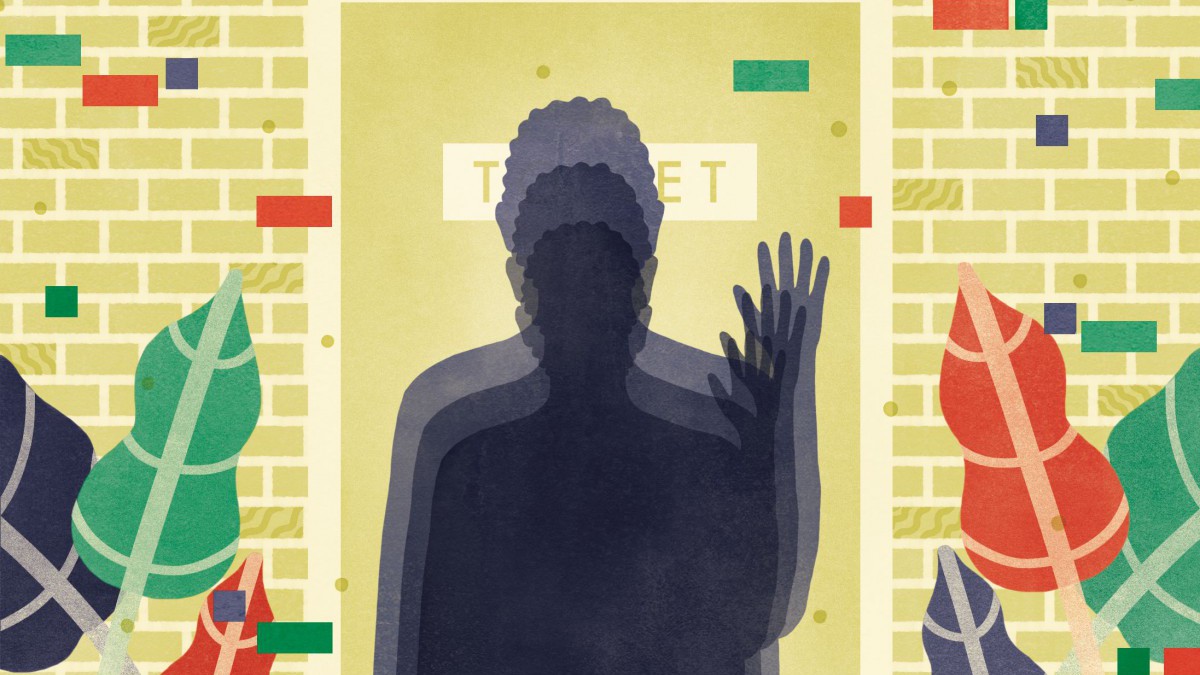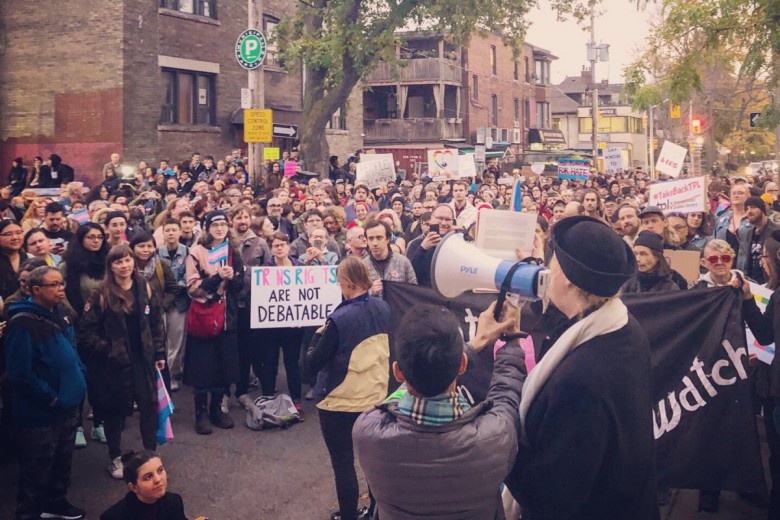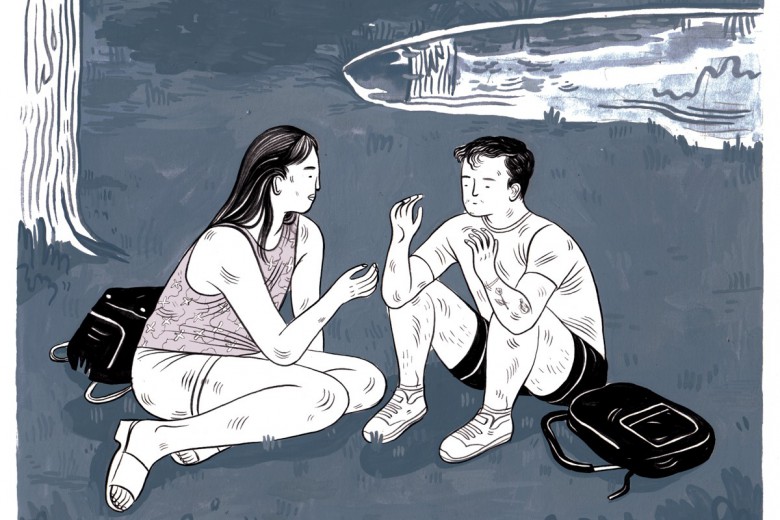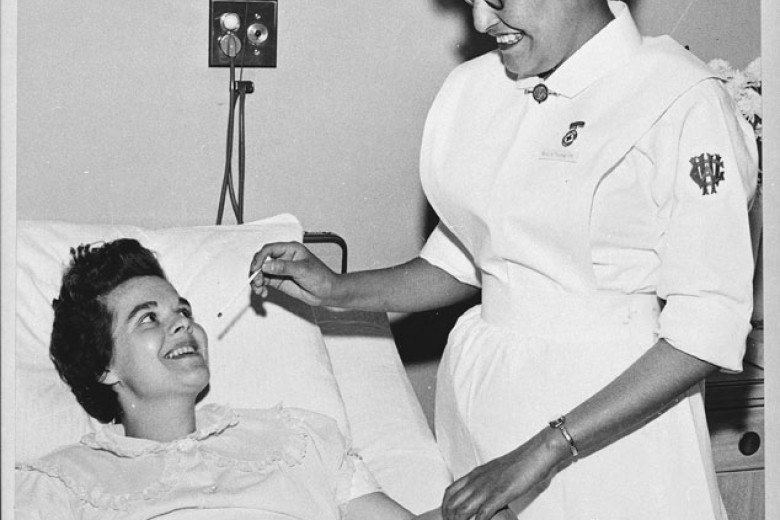Just off a first-floor common area at the University of Cape Town (UCT) in South Africa, there is an un-official washroom. This washroom is on UCT’s upper campus, which sits upon the eastern gradient of a mountain called Devil’s Peak. Overlooking the low-lying Cape Flats, where most of the city’s “non-whites” and poorest live, geography serves as metaphor in a city where municipal officials boast that there is now one “full-flush toilet” per 4.3 households, up from one per 9.6 households in 2006.
In an academic building named for the late revolutionary apartheid opponent Neville Alexander, the washroom is significant because of its availability to everyone. Signage reading “Toilet” in laser print on a sheet of A4 paper has been posted on the entry door, replacing the men-only sign that I remembered from the 1990s. Just beyond the washroom’s entrance, to the right, stand urinals with modest partitioning while, to the left, cubicles span nearly floor to ceiling, with doors lockable from the inside.
No official reason was offered to explain why this particular washroom has shed its binaried designation. Adding to the mystery, someone keeps putting up a competing sign, this one with a stick figure denoting a man. The competing signage might signal something banal if the standard pictogram gendering the washroom had simply fallen off. But that’s not what is happening. The informal signage, which forces users to rethink gender, signals that some type of decolonizing movement is taking place at UCT.
#RhodesMustFall
Since March 2015, UCT students have been galvanized by the decolonizing politics of the Rhodes Must Fall (RMF) movement (#RhodesMustFall), pursuing a set of disparate demands under a single banner. It has spurred popular debate beyond the Cape Town campus to other South African campuses and to Oxford University in the UK.
Rhodes Must Fall and related movements like Fees Must Fall were at one level born of a desire to remove a statue of 19th-century imperialist Cecil John Rhodes from its prominent perch on UCT’s upper campus. Rhodes – infamous for his desire to “annex the planets if I could” – owned the land upon which UCT is situated as well as huge swaths of land throughout southern Africa also legally stolen as imperial booty.
RACIAL NOMENCLATURE IN SOUTH AFRICARacial nomenclature can be tricky in South Africa – hence my use of quotes around “non-white” and “coloured.”
Underlying “non-white” is the binarized assumption that “white” is the norm against which diverse “other” groups are racially measured, with “other” groups being inherently inferior to whites.
“Coloured” – a term referencing those of “mixed race” – is contested because it underlies white supremacy’s power to name the “Other.” “Black” is preferred over “coloured” by some because “Black” reflects self-naming and it connects the racial struggles of groups oppressed by white supremacy. That said, many proudly embrace “coloured” because it distinguishes a rich culture.
On March 9, 2015, UCT student Chumani Maxwele threw a bucket of shit at the Rhodes statue, sparking a series of protest actions: students publicly holding university officials to account for multiple injustices, related teach-ins, and confrontations with security forces on campus, leading to tear-gassing and arrests.
Debate proliferated on national talk radio and television news programs, not to mention the country’s social media landscape. The evening television newscasts on the public broadcaster and the major independent station tended to highlight the demand for the statue’s removal and damage to property. More extensive or systemic coverage of the protest came from print and radio talk shows, with opinion pieces in the former and program guests on the latter coming from RMF leaders and a wide range of their critics. Whites, especially older whites, mostly condemned the protests as the uncontrolled act of ungrateful young people privileged enough to receive a university education on land donated by Rhodes. Even some South Africans of colour with liberation struggle credentials found the extensive student demands excessive.
Within a month of the RMF protests commencing, UCT officials had the statute removed to the cheers of a sizeable crowd. Student-led protests had succeeded.
Beyond the symbolic politics of the statue, though, RMF activists sought to decolonize the university. The complexity of their decolonial politics made another speedy victory more complicated and less assured. UCT student activists sought institutional transformation that would uproot deeply embedded ideological traces of apartheid, and the colonialism that had survived apartheid’s formal end in 1994.
Students at UCT are resisting the binaries that characterize post-apartheid remnants. They see a South Africa where whiteness has been privileged and deemed supreme while “non-whites” have been denigrated. To some RMF student activists, gender, after apartheid, has continued to be regulated using conventional masculine-feminine norms without full recognition that many people fall outside these gendered boxes.
To student activists, decolonizing UCT must include racially transforming faculty demographics, not just the student body. As noted in a November 2014 statement by Max Price, the university’s vice-chancellor, only four per cent of South African professors are Black Africans in a Black African-majority nation. Yet, without sensing the boast’s hollowness, Price heralded 72 per cent as the proportion of UCT’s non-academic staff of colour.
Decolonization as a transformative act that moves the campus from an apartheid and colonial norm to a post-apartheid sensibility should also, according to RMF student activists, include a new curriculum that reflects the African context as opposed to Europe’s. As far back as 2004, UCT’s student representative council asserted in the Student Transformation Charter that “education is not a neutral phenomenon, but an ideology.” Calls for “Africanisation” of the curriculum meant that African scholarship should be “incorporated into [the] research, teaching and curriculum of the university.”
Student activists driving RMF have also tied their decolonizing activism to, among many causes, tuition-free higher education (#FeesMustFall), the labour struggles of subcontracted campus workers who are disproportionately Black and female, efforts outing sexual violence concealed by university administrators and the larger society, and LGBTQ struggles against cisgender heteronormativity.
The UCT Trans Collective, a group consisting mostly of trans students of colour but also gender non-conforming students and allies, has articulated its concerns to the university community within a decolonizing framework consistent with RMF. They have readily linked the most progressive RMF positions to a politics consistent with decolonizing the toilet.
One year to the day that Maxwele threw shit at the Rhodes statue, the university’s Centre for African Studies gallery hosted an exhibition titled “Echoing Voices from Within” that looked back at UCT’s RMF movement. RMF activists contributed many of the exhibited items from their own RMF archives, and the show was co-curated by a graduate student active in the movement and a member of the gallery’s professional staff. Trans Collective activists crashed the exhibition, objecting to the fact that the event’s organizers had failed to recognize trans leadership in RMF: naked trans activists with red paint on their bodies blocked gallery entrances and passageways, and defaced some exhibition images and objects.
A statement posted to the collective’s Facebook page the next day, March 10, 2016, relayed a more detailed and defiant, yet forward-looking, explanation of the group’s action at the opening. The collective specifically accused Black cishet men (i.e., straight Black men whose gender aligns with the gender they were prescribed at birth) and complicit Black cishet women at UCT of using the show to reimpose colonial and apartheid binaries upon Black trans bodies. In line with American critical race theorist Kimberlé Crenshaw’s work, UCT’s Trans Collective embraced and asserted the intersectionality of their race, class, gender, and sexuality, including within RMF: “Our role has now evolved into speaking back to RMF and keeping it accountable to its commitment to intersectionality precisely because it is positioned as a black decolonial space.” The collective concluded: “There will be no [decolonized South Africa] if black men simply fall into the throne of the white man without any comprehensive reorganisation of power along all axis [sic] of the white supremacist, imperialist, abliest [sic], capitalist cisheteropatriarchy.”
Today, RMF and related student movements – particularly Fees Must Fall – remain divided along race, class, and gender, not to mention party affiliation and other lines. The collective’s visibility has receded and its members are now hard to find. RMF itself has given way in prominence to Fees Must Fall as a different kind of decolonizing movement focused on securing wider access to university education for those most impacted by colonialism and apartheid. “Fallism,” as student activists characterize their revolutionary aspirations, is currently a precarious undertaking.
Non-gendered washrooms
Washrooms should not be forgotten in the political mix. Public spaces like washrooms exemplify the banal acceptance of gender binarism. Historically, their designers have helped to spacialize public washrooms as places where masculine-feminine norms prescribe who can use which facilities. The gender binarism embedded in public washrooms has survived apartheid’s formal end, even as separate “white” and “non-white” washrooms are so clearly absurd and anachronistic to us in 2017. At its most revolutionary moments, RMF, along with campus groups like the Trans Collective and Queer Revolution, helped South Africans see the toilet as a site of colonial struggle, with gendered toilets being monuments to patriarchy and cisgender supremacy contiguous with the same rationales used to normalize white supremacy under colonialism and apartheid. Thus, RMF ideals, as championed by the Trans Collective, have made one public washroom in UCT’s Neville Alexander Building a site of decolonial struggle.
In August 2014, before RMF had escalated and the Trans Collective had admonished the group, UCT had officially designated a single “gender-neutral” washroom complete with inclusive signage. This washroom is a multi-stall facility, with two cubicles instead of a single-stall washroom (the latter basically being a standalone washroom with a single toilet and sink, like home units).
This official non-gendered washroom was represented by university officials and in press accounts as a progressive development, though not a decolonizing one. But this washroom remains the only official non-gendered facility on the part of campus where most of the institution’s 26,000-plus students, as well as a large swath of its faculty and staff, study and work. Everything else that might be considered non-gendered is single-stall and more likely intended for people with impairments.
In September 2015, a little more than a year after the university heralded its designation of one non-gendered bathroom, the Trans Collective rebelled against the creation of this washroom economy – that is, the disproportionate lauding of efforts to install only one non-gendered washroom: it removed gendered signage on multiple campus washroom stalls. The university administration’s self-congratulatory focus on the single gender-neutral washroom was, for the collective, the way that the institution perpetuated the privileging of cisnormativity.
Washrooms without an official gender designation have burgeoned on South Africa’s post-secondary campuses since UCT’s 2014 rollout, primarily to recognize trans identity and to acknowledge the need for the trans community to have comfortable and safe facilities. But official designation of non-gendered washrooms has not kept pace with the need to have public facilities on campus where people work and study.
Tolerance trap
Northeastern University sociologist Suzanna Walters might call the current provision of non-gendered washrooms at UCT a “tolerance trap.” To Walters, the framework of tolerance neutralizes queer political power when tolerance is misread as a progressive act. In The Tolerance Trap, Walters writes, “Tolerance is not an embrace but a resigned shrug or, worse, that air kiss of faux familiarity that barely covers up the shiver of disgust.”
The underlying power asymmetry of cisgender supremacy isn’t fundamentally challenged by a limited number of washrooms without gender designation, or by dispersed single-stall washrooms really intended for use by people with impairments.
Finding a solution beyond tolerance requires considering the multiple levels at which decolonizing the toilet works in South Africa and elsewhere. To start, different stakeholders want different things, and think differently about non-gendered washrooms. For the Trans Collective and trans students, there is a practical need for a washroom they can freely use. There is also the very political Trans Collective desire to rupture gender binaries. The collective’s progressive solution interestingly overlaps with the fix sought by university administrators. The plodding reaction of the administrators who’ve implemented solutions should be read as an attempt to keep students quiet, and to stay out of the headlines, as well as to advance the institution’s educational mission that reflects European culture more than the cultures of Africa.
Ultimately, liberation from the sexual and gendered binaries bestowed by the Enlightenment and reiterated through colonialism and apartheid is possible in part when there are multiple non-gendered washrooms with multiple stalls (nearly if not completely floor-to-ceiling, for privacy and safety) and no urinals (which are gendered objects). Outside the North American norm, these facilities should not have the openings at the bottom and on the sides, since that provokes policing and diminishes people’s security.
Rendering the decolonized toilet invisible
Tish White, coordinator of the Wits University Sexual Orientation and Gender Identity Advocacy Programme, in 2014 took a different approach and organized a series of meetings with transgender students. Gender-neutral washrooms were high on the list of trans students’ concerns. Two years after the meetings, Wits, located in the South African economic hub of Johannesburg, has multiple multi-stall, gender-neutral washrooms located throughout its campus.
White told me that multi-stall washrooms made the most sense for Wits. The university started by “converting” multi-stall washrooms to non-gendered spaces as opposed to “creating,” or outfitting, new multi-stall toilets. Conversion, said White, is easy; the major cost comes from new signage. The new facilities benefit the institution’s trans community, as well as people with impairments and parents whose gender differs from that of their children.
Spaces like the non-gendered washrooms at Wits are important in both symbolic and transformative veins. According to White, “gender-neutral toilets are a key component of the decolonizing project” that significantly start to undo sex-gender binaries that were not necessarily as binary before colonization, as documented by Gay and Lesbian Memory in Action (GALA). Thus, for White, “implementing gender-neutral facilities challenges the cisnormative legacy of colonization.”
These washroom politics in South Africa are beginning to expand into spaces beyond the universities. In at least one suburban Cape Town primary school, administrators have begun to consider gender inclusion over tolerance. Rose-Anne Lawrence Reynolds, former Head of Inclusive Support at the multiracial and multicultural Pinelands North Primary School, which has almost 500 learners from multiple socio-economic classes, told me that space recently became available adjacent to the school’s sports field. Administrators decided to convert the space into a non-gendered washroom with multiple stalls at minimal cost. Likewise, the long-term goal is to convert most gendered washrooms at the school to non-gendered washrooms. Early reservations from parents receded with more information.
One day, the young learners at Pinelands North Primary may be post-secondary graduates who will, upon their arrival at UCT, look for washrooms. By then, there may be real moves toward decolonization, and perhaps these students will not have to look too hard. By then, maybe non-gendered washrooms will be commonplace. UCT students who had attended Pinelands may then only know washrooms, in the broad sense – with the labour of decolonization perhaps so successful as to be unnoticeable.



_780_520_90_s_c1_c_c.jpg)



